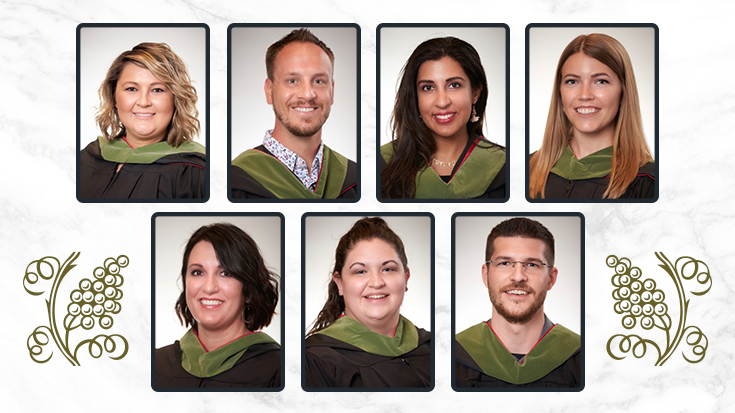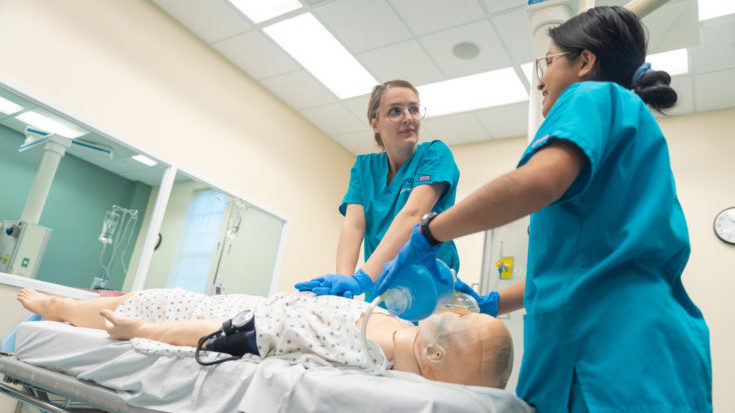
May 9 was a red-letter day for Ohio State University (OSU) and the entire respiratory care profession. The first class of students to earn the Master of Respiratory Care, Advanced Practice degree received their diplomas.
The degree is the first in the country designed to prepare respiratory therapists as advanced care providers at the master’s degree level.
Courtney Thompson, MRT, BS, RRT, and Tiffany Shook, MRT, BS, RRT, were among the first seven RTs to graduate from the program. Thompson is the respiratory team leader for The James Cancer Hospital at The Ohio State Wexner Medical, and Shook is respiratory therapy education team lead, also at Wexner.
“I decided to enroll in the master’s program because I knew that I wanted to further my career in the field of respiratory therapy as a clinician and not necessarily go into management,” Thompson said. “I love being a respiratory therapist.”
Said Shook, “I have been a bedside RT for almost 15 years. While that career has been very rewarding, I knew I wanted to do more. The master’s program at Ohio State was the only program with a focus on advanced practice that would still allow me to specifically treat cardiopulmonary patients and broaden my skills and scope of practice.”
Years in the making
According to Program Director Georgianna Sergakis, PhD, RRT, FAARC, the advanced practice program was years in the making. The idea first surfaced in 2007 during conversations between former OSU RT Department Director Marc Mays and then OSU Program Director and now Emeritus Faculty Herb Douce. In 2012, a statewide needs assessment was conducted to confirm the need for this level of RT practice in the state. The study was published in 2014.
“We developed a proposal and went through a total of six different committees at our university for approval,” Dr. Sergakis said. “The final step was that the program was approved by the Ohio Chancellor’s Council on Graduate Studies — State of Ohio approval — in December 2017.”
With that approval in hand, the team pursued CoARC accreditation. Provisional Accreditation was granted in December of 2019, and the first cohort of seven students began the program shortly after that.
“Our decision was based on years of discussion with our Advisory Committee that includes hiring managers and physicians about how to retain the best and brightest in the profession,” Dr. Sergakis said. ”The physician shortage and the increased need for advanced practice providers were also factors that were considered.”
1,000 hours
Associate Professor and Director of Clinical Education Sarah Varekojis, PhD, RRT, FAARC, explains how the Master of Respiratory Therapy (MRT) degree at Ohio State differs from other master’s level RT programs out there today.
“Most master’s degree programs for RTs currently available are focused on advanced education in leadership, research, education, and administration,” she said. ”This is a clinical practice Master of Respiratory Therapy that leads to a role as a cardiopulmonary advanced practice provider.”
The key factor making the degree so unique is the requirement that students complete 1,000 hours of clinical experience within the curriculum. A physician currently facilitates these clinical experiences.
Dr. Varekojis believes students who graduate at the advanced practice level will add significant value to the team of providers already in place and will help to expand the scope of practice for RTs. Her colleague on the faculty, Clinical Instructor Jessica Schweller, CNP, agrees.
“The APRT’s combination of education and RT experience positions them optimally to provide immediate and value-added contributions to cardiopulmonary specialty practice and transform the care delivered by the cardiopulmonary team,” she said.
Dr. Sergakis notes that the new degree may help recruit new students to the profession who otherwise might take their desire for a career in health care in a different direction as well.
“This opportunity for career advancement in respiratory therapy will act as a recruitment and retention tool for the best and brightest in the profession to not only advance their clinical RT skills, but also perhaps this could influence an individual to choose RT in the first place,” she said.
Paving the way
Courtney Thompson and Tiffany Shook plan to put their new degrees to good use in their current positions and beyond.
“My major career goals are to get out into the workforce and show people what an APRT is and does,” Thompson said. “There is no one else out there like us, so it is very important to me to pave the way for others after me and the profession as a whole.”
Shook is looking forward to using the knowledge and skills she gained in sleep respiratory care during the program to bring better treatment and care to those who need it, especially in underserved communities.
“While we were exposed to a wide variety of clinical settings during our rotations, I developed an affinity for sleep medicine,” she said. “I also enjoy education, so I would like to develop and implement an outreach program within sleep medicine to help serve those patients who may be socioeconomically disadvantaged.”
Her Capstone project highlighted the great need for sleep testing and treatment in the Hispanic community. “I credit the master’s program with broadening my knowledge of how to identify a problem, ask the right questions, investigate and research the subject, and present the knowledge in a systematic way,” she said. “This process and skill are what will help lead change and engage the APRT within their roles.”
Be a trailblazer
Both of these newly graduated MRT therapists highly recommend Advanced Practice Respiratory Therapist programs to their peers who want to stay on the clinical side of the profession.
Said Thompson, “The MRT program is perfect because we are able to still work at the bedside and be a part of our patients’ lives and take care of them. Having the increased knowledge that we gained in our master’s program allows us to do that and use our respiratory therapy background.”
“I would recommend the master’s program to any RT who is wanting to do more,” Shook said. “The path may be new, but it’s exciting and gives you an opportunity to become a trailblazer within the health care field.”
Congratulations to Courtney Thompson, Tiffany Shook, and the other five new MRT grads, Andrew Shonk, Mindy Conklin, Nicole Letcher, Punam Shingala, and Scott Hazelwood!
Learn more about the Advanced Practice Respiratory Therapist on the AARC’s Advanced Practice Respiratory Therapist page. You’ll find an overview of the role, along with an FAQ that will answer all of your questions.
For more information about the advanced practice program at Ohio State, visit their Master of Respiratory Therapy page.
Email newsroom@aarc.org with questions or comments, we’d love to hear from you.













